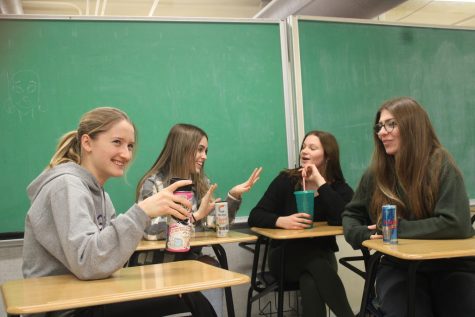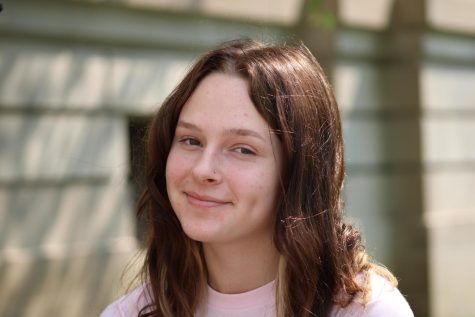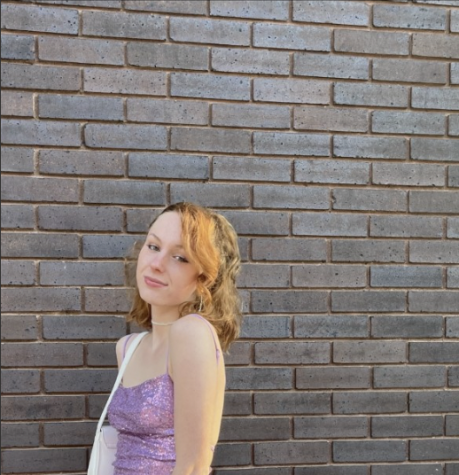Caffeine integral part of routine for Central students, staff

Roaming the halls of Central, it’s easy to identify that a large number of the students and staff are addicted to some form of caffeine or another. Cans of fruity energy drinks and tumblers filled with aromatic coffee are tightly clutched in many’s grasps, and packs of powdered caffeine are safely stored in book bags in case a midday jolt is necessary. While people hyper focus on the negative effects of nicotine, alcohol and drugs on growing minds, people often fail to remember teenagers are directly affected by a legal, societally acceptable and highly addictive drug daily—caffeine.
Juniors Sarah Spomer and Casey Sanden both began drinking coffee in middle school. While Spomer has stuck strictly to coffee since seventh grade, Sanden, after drinking coffee every morning from sixth grade to eighth grade, introduced energy drinks to her daily routine in high school. Spomer was drawn to caffeine because of the taste, but Sanden was drawn to it as an antidote for her drowsiness. “Sophomore year and freshman year I was sleeping through a lot of my classes, so that’s when I ramped up the caffeine consumption,” Sanden said.
Spomer, who averages two cups of coffee a day, does not rely on the beverage to keep her awake, but for a consistently delicious flavor. “It just became a daily thing for me. I don’t think having to wake up early or having such long days affected how much I would drink, I just always ended up drinking it,” she said.
Drinking a Red Bull every morning and occasionally a cup of coffee from Blue Line after school, Sanden doesn’t believe that she is addicted to either caffeinated drink, although she was in the past. In eighth grade after attempting to lay off coffee for a week, she experienced extreme migraines and genuine withdrawal. Now, she considers herself “cured,” having gone all Thanksgiving break without a drop of Red Bull and only having coffee on occasion.
“If the world was short of coffee, I would probably survive,” Spomer said. Due to her lack of withdrawals, she does not think she is a coffee addict, but her day is thrown-off if she does not have it. “It’s just a part of my routine, and I don’t like to change my routine,” she said.
Senior Bailey Peters believes it is the amount of work she took on as an AP scholar in her junior year that drove her to energy drinks. “Junior year was rough—it was really the first time I really had to start pulling all-nighters and trying really hard to do well in school and energy drinks were a nice little pick me up. They’re really my secret to success in high school, because you don’t need sleep if you have caffeine,” Peters said.
On breaks from school, like the past Thanksgiving break, Peters didn’t consume any energy drinks because she simply didn’t feel the need to. In regard to why she insists on drinking energy drinks at school, Peters said, “I feel like I’m a better person to those around when I have caffeine. I think it really helps me get into a better mood and take on my day.” When asked if she got into a mood over break without her energy drinks, she simply responded, “No, because I was able to get 12 hours of sleep, but at school, stay away from me if I don’t have my energy drink.”
Peters said on a typical school night she usually gets about five hours of sleep. “I live out west, so I have a long drive to school, so I have to wake up earlier. I have to work after school, so I get home a lot later. It’s rough. It’s a lot of time awake and I don’t really have time to nap, which I need, I need something to pick me up so energy drinks really save me there.”
Peters noted sometimes she’ll be so drained from her day that she doesn’t have the strength to start her homework at night and will down an energy drink at 9 p.m. just to make it through her assigned work. This will in turn keep her wired into the wee hours of the morning, so she’ll triple a dose of melatonin so she can fall asleep. “At this point, my sleep schedule is completely artificial,” Peters said.
Peters, who consumes on average two to three energy drinks daily, said when it comes to her caffeine intake, “I’m not addicted, I like to call it dependency.” She has never experienced withdrawal and does not think her anxiety is heightened by caffeine, a common symptom of the drug. However, she did note she now has the “jitters” or shaky hands quite frequently, but she said, “It’s just part of who I am now.”
While Peter’s caffeinated habits were brought on by the stress of being a high school student, senior Ella Novak began drinking caffeine from a source of comfort. Novak said her caffeine consumption increased a lot in high school because, “I’m tired all the time, so I drink a lot more coffee now.” However, her initial interest in coffee did not start as an antidote to drowsiness. “My mom was drinking it and I wanted to be like my mom. I love my mom. Overall, I think that coffee is a very comforting thing for me. I grew up around coffee, even in elementary school I just remember my mom drinking so much coffee and I just remember the smell in my house, and I have all these good memories with it.”
Consuming a tumbler of home drip coffee, and usually another cup of coffee after school from Blue Line, Novak said, “Unfortunately, I think I am addicted. I get really bad headaches and dizzy [without caffeine]. I don’t want to believe I’m addicted, but if I’m going through withdrawal symptoms and I drink coffee I instantly feel better.”
Even though all four students have varying habits and relationships associated with different forms of caffeine, it is evident that it is an integral part of the Central community and the everyday life of high school students.
Your donation will support the student journalists of Omaha Central High School. Your contribution will allow us to purchase equipment and cover our annual website hosting costs.

Hello, my name is Hadley (she/her), and I am a Senior at Central. This is my second year on staff and my first year as Chief Copy Editor. I was voted most...

My name is Alice! My pronouns are she/her and I’m copy editor for The Register this year! This is my second year on staff and I am most likely to volunteer...

Hey, my name's Sophie and I'm a second-year staff photographer. When I'm not taking pictures I like listening to music, going on walks, and hanging out...












